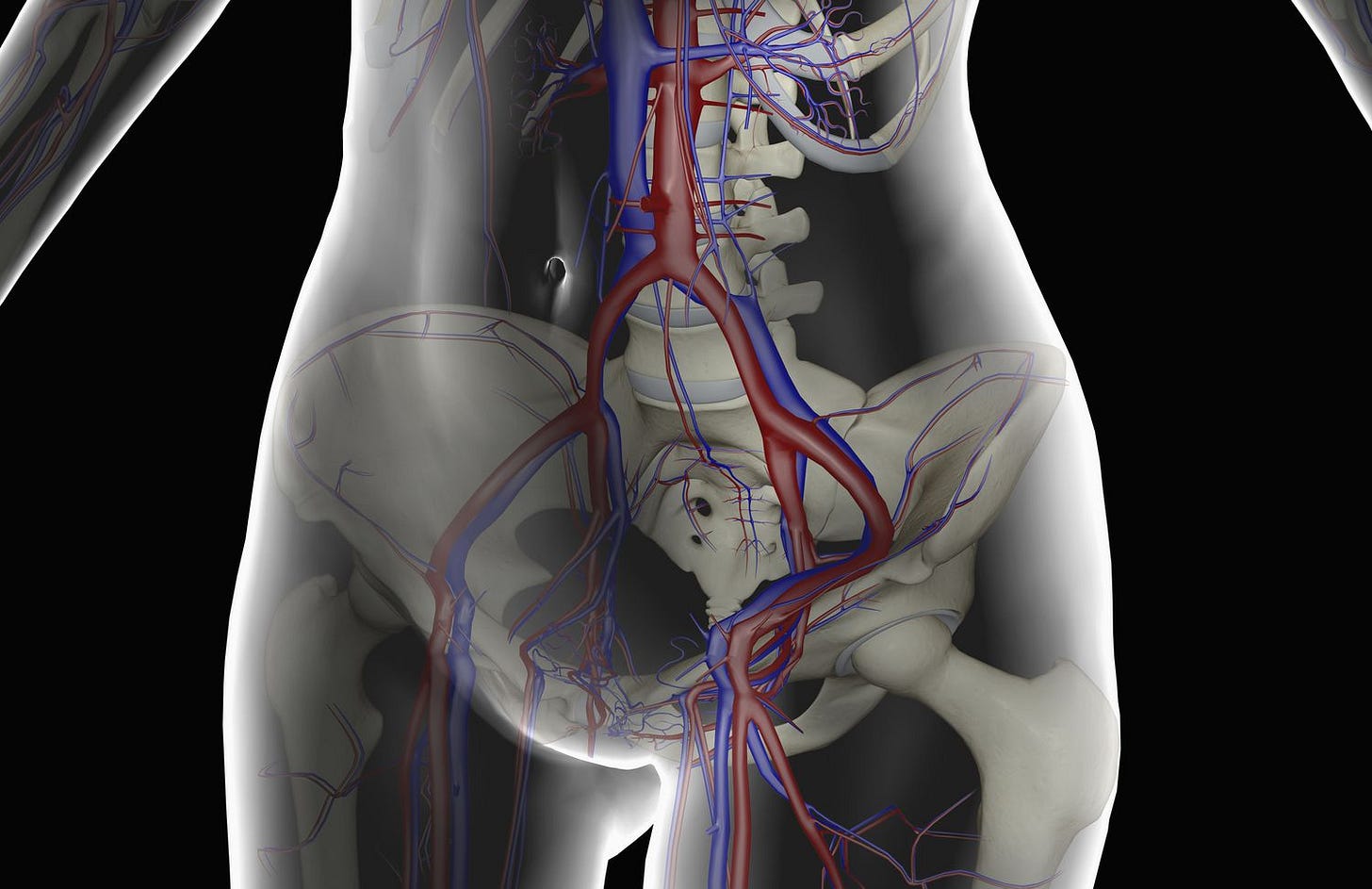The Root Cause of All Illness
Recently, I have been thinking about the common elements of illness. In this article, I make the case for the most fundamental root cause of disease.

Introduction
If you are an avid user of social media, you will have noticed many health coaches who claim that the one thing they are concerned about is the most important risk factor for disease.
There are those who claim that the biggest problem is sugar. Others insist it is the presence of seed oils and its derived products in all of our food. Some take offense that humans should eat any vegetables. The list goes on.
Which one is most worthy of our attention and efforts?
This is the question I will address.
False Confidence
In modern healthcare, we have a tendency to wax poetically about how we live in an age of chronic disease. The concern for acute illnesses like infections, sepsis, and excruciatingly painful accidents are a thing of the past.
Not a thing of the past, per se. But, we like to impress the population by telling them that we have pretty much figured out how to ‘cure’ these acute problems.
Antibiotics. Steroids. Painkillers.
Of course, over-reliance on these class of drugs comes with downside.
Regardless, don’t let this mantra fool you. We are not merely living in an era of chronic disease.
Just because we have the drugs to quickly relieve our bodies of acute illness, does not mean that acute illness is not a problem.
On the contrary, as rates of chronic disease continues to rise within the population, so too will the rate and severity of acute illness.
This is precisely why seasonal flu has been getting worse over the last few decades. It is not because influenza is evolving with the intention of harming us. On the contrary - viral information is more likely to propagate if its host remains alive.
In reality, we are getting less healthy, and less able to handle acute bouts of illness.
This is reason that those who are chronically ill do far worse with acute illness.
For example, diabetics have far worse outcomes with infections compared to someone without diabetes.
Storing Energy
Before we start exploring the nature of disease in the modern world, we need to discuss the consequences of energy storage. To illustrate the point, we will use the example of a steel sword.
If you have watched any movie or TV show set before the era of ballistics and firearms, you will be aware of the deadly potential of sharpened steel.
A show I have been watching quite clearly incorporates this potential into its choreography. There is no need for hacking and slashing body parts into pieces with each conflict.
Instead, one or two well placed cuts uses the physiology of the body against itself. For example, a small cut through the neck (along the jugular vein) or along the inguinal crease will open up blood vessels so large that the body bleeds to death within minutes.
However, this deadly potential is only possible after the storage of incredible amounts of energy into the object that is then placed into contact with the human body.
You could not wreak this sort of havoc on a human with the substrate that steel is derived from - iron ore deposits.
These irregular blunt objects cannot be used to make incisions of surgical precision.
There is a long, arduous and energy intensive process the ore needs to undergo.
Once you have extracted the iron deposits, you must then remove its impurities by smelting at high temperatures. Then, using similar high temperature you must forge the metal into the proper shape. This process is then followed by hours of hammering under high temperatures to mold the iron into something resembling a thin blade. Each swing of the hammer stores more energy into this piece of metal. Finally, the blade must be sharpened and refined.
Each step in the process stores more and more potential into the blade. You no longer need to exert yourself to bludgeon someone to death with raw unrefined rock. Instead, using effortless surgical precision, you can induce the body to unravel in a matter of seconds.
This is the power of refinement.
The Power of Refinement
In the modern ‘civilized’ world, the power of refinement is perfectly illustrated by surgical intervention.
The surgical field is one of the most incredible developments of modern medicine. However, its capacity for life-saving heroics is accompanied by potential for some truly life-destroying complications. There is no such thing as minor surgery.
There are cases of people going to the plastic surgeon for some lunch-time liposuction, only to suffer from a fatal bowel perforation.
I digress.
The devastating potential of refinement is not reserved to sharp metal objects.
Synthetic drugs are another great example.
Before Aspirin, humans used to make tea from the bark of Willow tree. At some point, a bunch of nerds in a lab decided that salicin was the active ingredient in this plant and ran with the idea of purifying and synthetically recreating this naturally occurring substance. This synthetic and refined substance we call acetylsalicylic acid.
However, willow bark has a far broader and nuanced composition that results in its anti-inflammatory and analgesic effects. In fact, some estimates suggest that it is only about 4% salicin.
Aspirin has a relatively narrow mechanism of action, and significant side-effect profile depending on dosage and length of use. Willow bark, on the other hand, has a broad mechanism of action including inhibition of cyclo-oxgenase, lipoxygenase, hyaluronidase, impact on cytokine release and anti-oxidative properties.
This broad spectrum of effect combined with its limited side-effect profile when taken at therapeutic doses, is a reflection of the harmony between living organisms and naturally-derived medicines.
Natural products must evolve with their surroundings. The willow tree cannot concentrate salicin to such a degree that it would have deleterious impact on the life around it. Simply because this would then have an indirect impact on its own growth and development.
Like the willow tree, we are impacted by our environment.
Our World of Refinement
Circling back to my first statement about health gurus touting The Next Bad Thing, we need to answer the question:
If we want to lead a healthy life, which element of modernity must we be concerned with to avoid disease?
Answer: Refinement.
We like to think of refined things as good. We use it in common parlance when we want to describe positive qualities about an object.
However, like the steel sword, the process of refinement is necessarily accompanied by the storage of potential.
Once we consume the refined object, it must now interact with all of our being. In doing so, our body begins to unravel just as it would if it were impaled by a sword.
Refined sugar → diabetes
Refined vegetable oil → widespread inflammation
Refined opium → fentanyl overdose
This is not just confined to food & drugs. Once you start thinking about this problem, you will start to see it everywhere.
Alcohol is far more concentrated today than it was traditionally.
Cannabis has become highly concentrated, beyond anything resembling healthy.
Sexual arousal? Rampant production of pornography and sexualizing.
Lust? Almost every single person I know is using dating apps and treating partnership like a transaction.
Attention and validation? Social media apps have cornered this market.
Electromagnetic Radiation? It used to just be the sun and cosmic rays. Now, we are flooded in artificial high-frequency radio waves all the time. This is likely leading to many diseases.
The Age of Resistance
All of these refined stimuli inevitably lead to resistance. Resistance is the word we use to describe when our bodies have been so overexposed to a stimulus, that it is no longer capable of dealing with that stimulus effectively.
High fructose corn syrup → Insulin resistance.
Social Media attention → Dopamine resistance.
Unearned sense of societal value → Serotonin resistance.
What do you think happens to depressed patients who are given drugs to artificially increase serotonin levels? They get even more resistant to serotonin. Exactly likely giving insulin to people who are insulin resistant. It is a vicious cycle.
The problem is that these changes to our environment and way of life did not happen overnight. These are gradual and insidious changes.
We must stay vigilant.
Renounce refinement.





Homeopathy takes a huge variety of natural substances and refines them through a series of dilutions which increase their potency and their energy. I believe that it isn't for everyone, especially if you have a toxic diet, as you refer to. Once someone is on the path of maintaining their health, doesn't receive vaccines, exercises daily and has a positive mind, homeopathy is the most non-toxic subtle intervention available. I have been taking homeopathic remedies for all types of issues since 1983 and have never once had a bad reaction. One's immune intelligence is activated and if you use the most appropriate remedy for the symptoms healing is usually quick! You can find volumes of Materia Medicine. Here is one of the best:
http://www.homeoint.org/books/boericmm/index.htm
And an article from Vancouver Homeopath about Scientific Research of Homeopathy
http://www.homeoint.org/books/boericmm/index.htm
Thank you for allowing me to comment and thank you for your article.
Exactly. And that allows it to work above the confusion of the body, addressing the source of all healing. The best way to understand how homeopathy works, is to try a remedy on yourself. The "experience" for each person depends on how receptive and open they are to a holistic healing. I suggest subscribing to Dana Ullman's substack page https://danaullman.substack.com/p/disinformation-on-homeopathy-two?utm_source=post-email-title&publication_id=517471&post_id=123169941&isFreemail=true&utm_medium=email.
Dana Ullman is a brilliant homeopath who has been helping people for over 40 years. I am sure you know that homeopathy was the first form of accepted medicine in America before the Flexner Report in 1910. A true tragedy for human health and healing. There are homeopathic remedies for absolutely everything. I was bitten by a snake a few years ago which caused horrible clotting and inflammation (a long story) I took Lechesis 200 C potency, which is snake venom. I take Arnica montana before and after any type of surgery--healing much quicker. For covid Cinchona, which is hydrochloroquine; coffea cruda for depression and insomnia. . . . Well, you can explore and download the repertory from the Ainsworth Homeopathic Remedy page https://www.ainsworths.com/remedy-store/ . . .so impressive! Like all of the excellent alternative therapies which can help or cure chronic health issues, homeopathy is at the top.